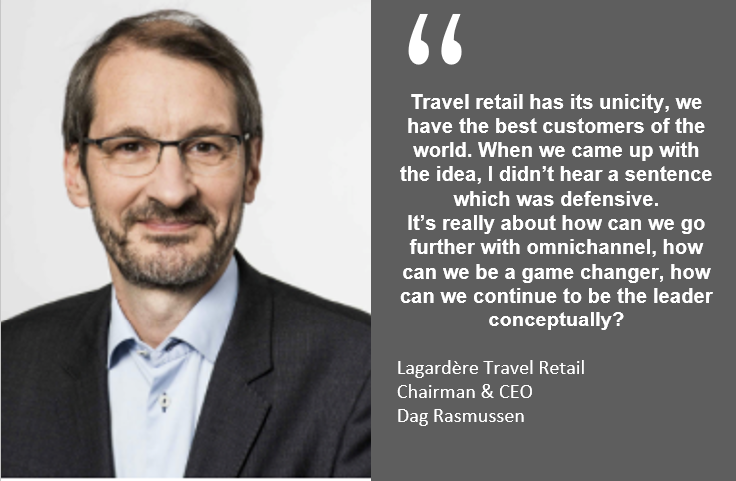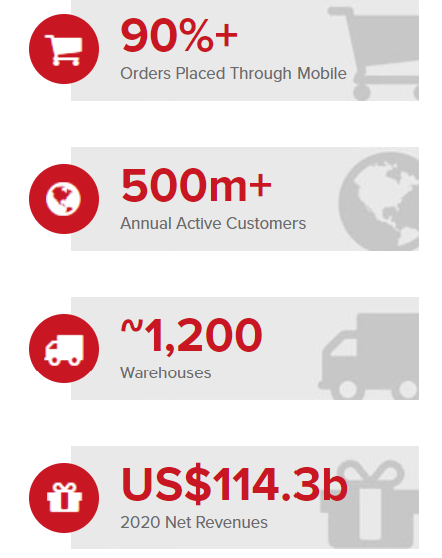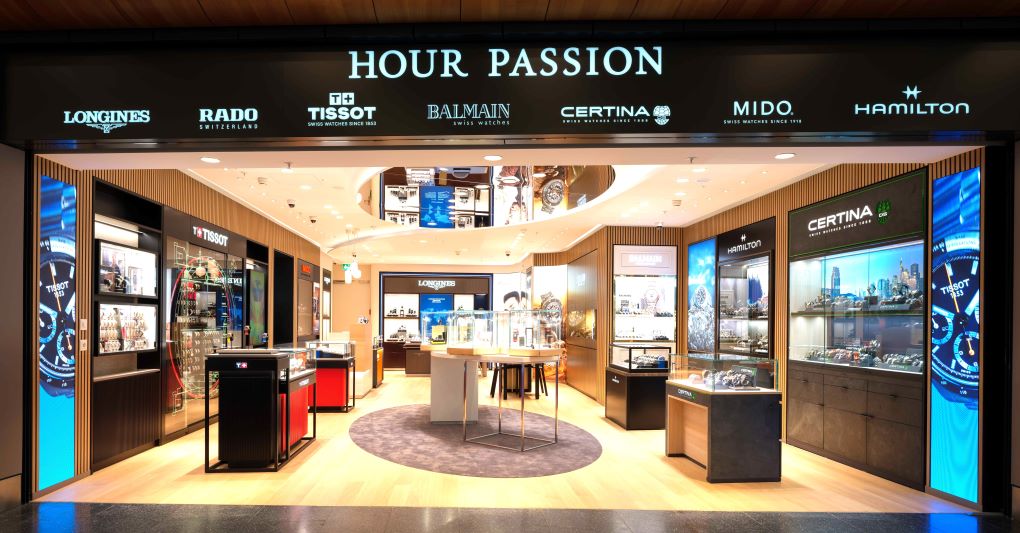CHINA/FRANCE. “We know that this digitalisation trend, multi-channel [retail] is mostly Chinese today. What we know is that if we learn from the best country with the best player, we can then maximise the chances of spreading all these good ideas in the [Lagardère] Group. So it’s a Chinese-born project, which we will follow very intensively centrally and globally.”
The words of Lagardère Travel Retail Chairman & CEO Dag Rasmussen sum up the potentially transformative nature of yesterday’s announcement that ecommerce giant JD.com and leading Chinese state-owned fund JIC are investing CNY720 million (US$111.4 million) in Lagardère Travel Retail’s North Asia business. The deal, when completed, will see the investors hold 22.36% of the company’s post-offering share capital.
Rasmussen was speaking alongside Lagardère Travel Retail North Asia CEO Eudes Fabre during an interview with The Moodie Davitt Report Founder & Chairman Martin Moodie hours after the announcement.
[Click on the Podcast icon to hear Dag Rasmussen and Eudes Fabre in conversation with Martin Moodie]
Having launched operations in Mainland China in 2007 and Japan in 2020, Lagardère Travel Retail is now present in 32 airports and 28 high-speed railway stations in North Asia, with a network of 480 stores across categories including luxury, duty-free, travel essentials, specialty retail and food & beverage. That stronghold is set to grow strongly working alongside JD.com, which has a customer base of some 530 million people.

Fabre – who revealed that Lagardère’s discussions ahead of the deal with JD.com and JIC have been taking place over the last few months – gave his take on the rationale behind the ground-breaking move.
He said: “I think there was the willingness [from Lagardère Travel Retail] to do something big in the omnichannel space. Even though we are also doing our own digital initiatives, including ecommerce, we thought that there was a real opportunity to accelerate that dramatically and do something big with an industry heavyweight such as JD.com.
“From JD’s perspective, as a big online retailer, they’re very interested first in duty free, but they’re also interested in physical retail. JD is doing it, Alibaba is doing it, Amazon is doing it. More and more of these internet giants are realising the value of the ability to have more personalised interaction with consumers in a physical setting.
 “I think both sides quickly saw the great potential; it was kind of a convergence of minds, both on our desire to accelerate the digital positioning of our business, and JD’s strong interest in travel retail, and then this fusion of the online and offline experience, and especially leveraging the fact that we have high-profile stores in high-traffic locations.
“I think both sides quickly saw the great potential; it was kind of a convergence of minds, both on our desire to accelerate the digital positioning of our business, and JD’s strong interest in travel retail, and then this fusion of the online and offline experience, and especially leveraging the fact that we have high-profile stores in high-traffic locations.

“These are just the initial ideas that led to this partnership. But I think there’s a lot more that can be done. So far we’re just scratching the surface in terms of our [the partnership’s] potential.”
Rasmussen emphasised that the deal with JD.com and JIC is not a defensive move, reiterating his long-held view that he has “never seen ecommerce as a threat to travel retail”.
He continued: “Travel retail has its unicity, we have the best customers of the world. When we came up with the idea, I didn’t hear a sentence which was defensive.
“It’s really about how can we go further [with omnichannel], how can we be a game changer, how can we continue to be the leader conceptually, and so on. It’s not easy, the challenge is still in front of us. But I think we have the best bricks [with this deal] to do so.”
He added: “We see what’s happening in China [with omnichannel], it’s such a huge complement [to the travel retail business]. And the sum of both parts is something which can bring much more than the individual parts.”
Fabre echoed the belief that the partnership was not a defensive move. He said: “On the contrary, it’s meant to be a ground-breaking, transformative alliance, which really enables a new type of business model, which ultimately is going to deliver a better experience for consumers and a better commercial performance for our brand partners and our landlords.”

Asked about the role of the state-owned fund JIC, Fabre suggested that it reflects how much Lagardère has integrated itself into Chinese society that his company would attract this level of state interest and investment.
He explained: “We’ve been in Mainland China for almost 15 years now. We’ve known since the early days, that the key to success in China is to first adapt to the needs of the local market. Foreign companies can’t change the needs of the Chinese market, it’s the other way around.
“In order to be successful, you need a really localised business presence, whether it be [in terms of] teams or operational models. Everything needs to be made in China, for China.
“I think that’s the key to success. So by partnering with these type of prestigious local investors, we’re hoping that will help us become even more localised, and even more relevant to the fast-changing Chinese market.”
Asked to sum up his thoughts on the JD.com/JIC alliance, Rasmussen concluded: “It’s really something which is important for the Group as a whole, which we see as a game changer in many dimensions – the way we see travel retail, the way we see the interaction between digital and physical. We’re all very excited about how we can get value, create value and give value from this.”













